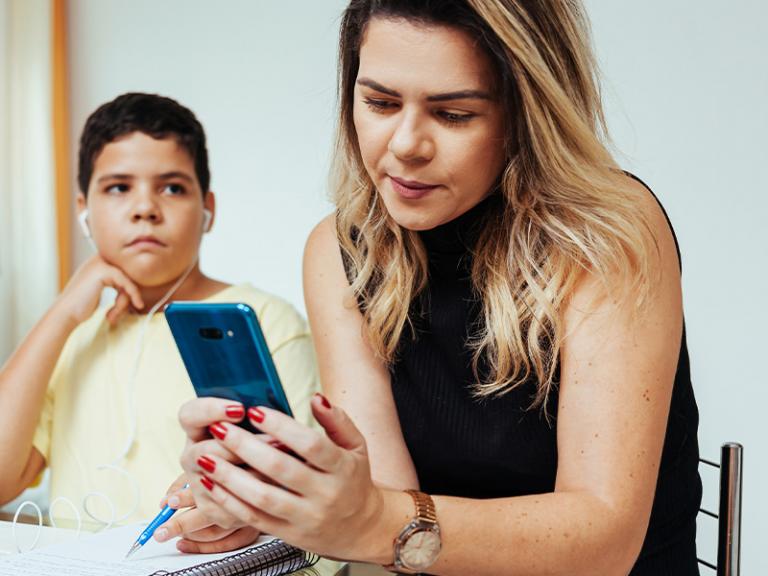When Maria, 37, and Jeff, 38, came to our first session for counseling they both complained about a lack of feeling connected with each other and said they were drifting apart since the CVID-19 pandemic. As they talked, it became apparent that they both spend an excessive amount of time on their computers between work and leisure time.

Maria put it like this, “Jeff and I barely talk anymore. We both work at home online and it seems like we’re always on our phones. We have a ten year-old son and we don’t even spend much time playing with him. I’m growing concerned but don’t know what to do about it.”
In a recent article for The Gottman Institute’s website, Nicole Schiener, RP, unpacks the all-too-common concerns around screen time. We’re all aware that we live in an increasingly connected world, and the influence of tech has crept into every facet of modern life. We learn, communicate, shop, and entertain ourselves online, and many find it difficult to put down their phones and laptops and engage “IRL.”
But here, Schiener’s focus is on the impact our use or misuse of our devices has on our relationship with our significant other. Her observation that “technology use has become a barrier to connection and turning towards screens instead of each other can reduce relationship satisfaction and put you at risk for burnout” may be discouraging, but she also offers a roadmap to overcoming the “often unconscious… unhealthy patterns” that screen time creates.
Schiener lays out her “Six Reasons Why People Turn to Tech and How to Turn Towards Each Other Instead” succinctly and in a way to provide a playbook for couples looking to put down their devices and focus on intimacy. First, she details the relatable behavior of staying up too late in order to have “me time.” She writes that for parents “caring for infants and toddlers or juggling childcare and paid work, it can feel like the only time you have to yourself is after everyone goes to bed.” Instead, Schiener suggests that it is “more helpful to try getting up a little earlier if possible or carving out a few minutes throughout the day for more intentional self-care and tech time.”
Schiener’s second point revolves around the resentment partners can feel for each other when they sense their spouse is pulling away by retreating into increased screen time. A lack of communication is at the core of this kind of resentment, and the solve may be simple: rather than “shutting down,” say what you mean. Honest, straightforward dialogue can bridge the gap and engender a sense of teamwork rather than division.
Likewise, Schiener’s next point centers on our natural need to “escape.” When we’re stressed, anxious or overwhelmed, it may feel comforting to retreat to our screens, which have increasingly come to be viewed as a safe, private space. Again, the key here is to tackle the tension head-on, leaning into communication rather than the inclination to close yourself off from the shared experiences and responsibilities of your relationship.
The fifth point in Schiener’s checklist identifies another universal behavior that stunts emotional connection in relationships — that is, the burdens that our digital society has placed on us with respect to work. We’re always available, and so often, productivity seems a click or a quick email away. But the inevitable result of the expectation that work should happen anywhere, anytime, is the erosion of the kind of boundaries that keep couples close.
Rather that approaching work with an unyielding sense of obligation, Schiener advises that partners should set up times and spaces where no screens are allowed. Establishing and honoring these boundaries will leads to a renewed bond that is built around these shared boundaries.
Finally, Schiener notes the role that boredom plays in spouses turning inward into increased screen time. She writes that “people crave the dopamine that comes from playing video games or getting likes online” leading to us “mindlessly turning to… screens.” Instead of succumbing to this temptation, a solution is at hand. Schiener counsels that we should “try engaging in shared physical activities or playing competitive games to quell boredom and release endorphins.”
Moreover, we should refer to a simple and perhaps happier time in a relationship, asking couples to consider the question “what did you used to do when you were dating?” By rebuilding the bonds that brought you together in the first place, couples can transform boredom into activities that indulge their interest, finding a new sense of inspiration and connection in share activities.
Follow Terry Gaspard on Twitter, Facebook, and movingpastdivorce.com. Her book Daughters of Divorce: Overcome the Legacy of Your Parents’ Breakup and Enjoy a Happy, Long-Lasting Relationship is available on her website. Feel free to ask a question here.
Terry’s forthcoming book, The Remarriage Manual: How to Make Everything Work Better the Second Time Around, was published by Sounds True in February of 2020.













